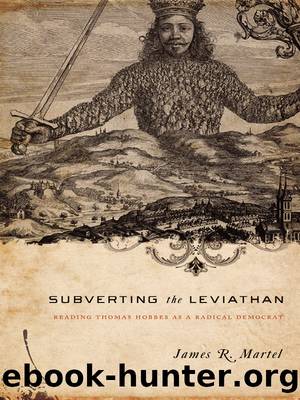Subverting the Leviathan by Martel James;

Author:Martel, James;
Language: eng
Format: epub
Tags: REL051000, Religion/Philosophy, PHI019000, Philosophy/Political
Publisher: Columbia University Press
Published: 2007-09-14T16:00:00+00:00
The Kingdom of Christ
The “other” kingdom of God, the kingdom of Christ, is distinguished from the kingdom of Israel by the fact that it does not yet exist. Hobbes tells us that unlike Moses, Christ did not have an actual kingdom on earth in his (first) lifetime. When Jesus tells Pontius Pilate, “My Kingdome is not of this world” (John 18:36), Hobbes reads this as meaning not that his kingdom is in fact in heaven but rather as an acknowledgment of the fact that “after the day of Judgement…there shall bee a new Heaven, and a new Earth; the Kingdome of Christ is not to begin till the generall Resurrection.”11
Hobbes tells us that Christ is already king in the sense that he is God (i.e., that part of Christ that is not God’s “person”) and hence, like God (and natural law), he is eternally and universally omnipotent. But in terms of his own kingdom, that which stems not from his identity with God but his personation of God, Hobbes writes: “But then he shall be King, not onely as God, in which sense he is King already, and ever shall be, of all the Earth, in vertue of his omnipotence; but also peculiarly of his own Elect, by vertue of the pact they make with him in their Baptisme.”12 Thus this kingdom, like the kingdom of Israel, will be a “civill” kingdom in the sense that it is produced not by God (or Jesus-as-God’s) absolute, apolitical power, but by the “Consent, and Covenant” made between God and the Christian community and hence by another iteration of the original covenant itself. Given his focus on our own “kingdomless” time, Hobbes is particularly interested in the way that Christ is himself not yet king. Whereas the kingdom of Israel ushers in law and sovereignty, the kingdom of Christ ushers in another kind of power, as demonstrated by the “pact [Christians] make with him in their Baptisme,” an indication of their consent to be ruled in a future kingdom by Jesus Christ. This pact is itself a reiteration of the promise wherein Christ is “the thing promised.” As a pact, the sacrament of baptism ensures that the kingdom of Christ will be, like the kingdom of Israel, a particular kingdom, composed only of those who have so promised themselves.
In considering the earthly power of Christ on earth before his kingdom, Hobbes writes,
For if the Supreme King [God], have not his Regall Power in this world; by what authority can obedience be required to his Officers? … But our Saviour was sent to perswade the Jews to return to, and to invite the Gentiles, to receive the Kingdome of his Father, and not to reign in Majesty, no not, as his Fathers Lieutenant, till the day of Judgment…. And [this power of persuasion] is compared by our Saviour, to Fishing; that is, to winning men to obedience, not by Coercion, and Punishing [i.e., via sovereign law]; but by Perswasion: and therefore he said not to his Apostles, hee would make them so many….
Download
This site does not store any files on its server. We only index and link to content provided by other sites. Please contact the content providers to delete copyright contents if any and email us, we'll remove relevant links or contents immediately.
| Anthropology | Archaeology |
| Philosophy | Politics & Government |
| Social Sciences | Sociology |
| Women's Studies |
The remains of the day by Kazuo Ishiguro(8419)
Tools of Titans by Timothy Ferriss(7833)
Giovanni's Room by James Baldwin(6830)
The Black Swan by Nassim Nicholas Taleb(6786)
Inner Engineering: A Yogi's Guide to Joy by Sadhguru(6455)
The Way of Zen by Alan W. Watts(6294)
Asking the Right Questions: A Guide to Critical Thinking by M. Neil Browne & Stuart M. Keeley(5369)
The Power of Now: A Guide to Spiritual Enlightenment by Eckhart Tolle(5354)
The Six Wives Of Henry VIII (WOMEN IN HISTORY) by Fraser Antonia(5246)
Astrophysics for People in a Hurry by Neil DeGrasse Tyson(5007)
12 Rules for Life by Jordan B. Peterson(4168)
Housekeeping by Marilynne Robinson(4075)
The Ethical Slut by Janet W. Hardy(4045)
Skin in the Game by Nassim Nicholas Taleb(3982)
Double Down (Diary of a Wimpy Kid Book 11) by Jeff Kinney(3941)
Ikigai by Héctor García & Francesc Miralles(3907)
The Art of Happiness by The Dalai Lama(3854)
Skin in the Game: Hidden Asymmetries in Daily Life by Nassim Nicholas Taleb(3739)
Walking by Henry David Thoreau(3697)
